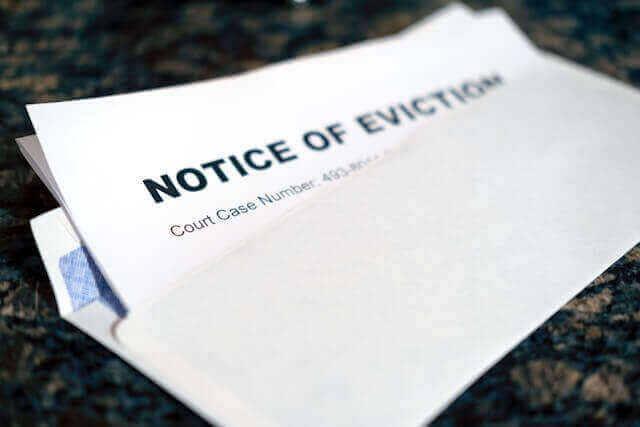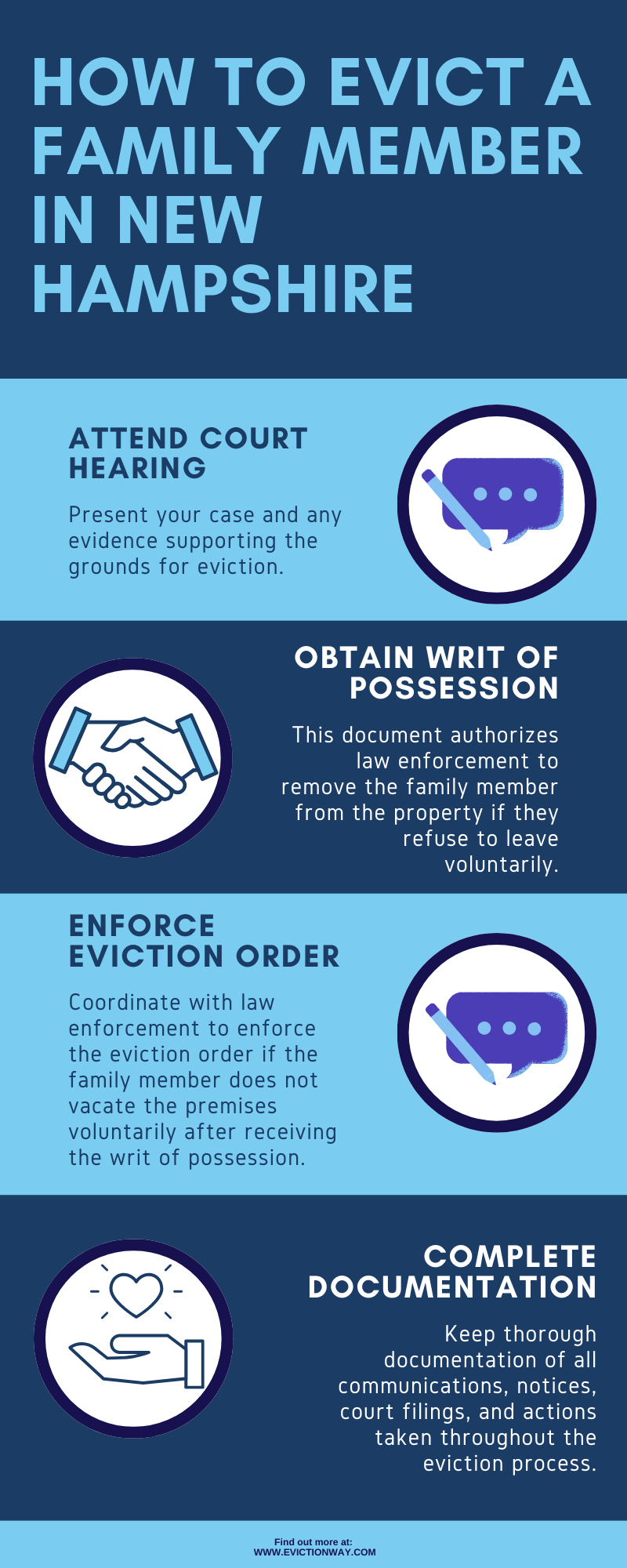Are you facing the difficult decision of evicting a family member in New Hampshire? You’re not alone. Many people find themselves in this situation, and it can be a complex and emotional process.
In this blog post, we’ll guide you through the steps on how to evict a family member in New Hampshire. We’ll cover everything you need to know, from the legal process to practical tips for making the transition as smooth as possible.
Evicting a family member is never easy, but it’s important to remember that you have rights as a landlord. If your family member is not paying rent, violating the lease, or causing damage to the property, you may have no choice but to evict them.

The eviction process in New Hampshire can be complex, so it’s important to follow the steps carefully. We’ll provide you with a step-by-step guide to help you navigate the process.
How To Evict a Family Member In New Hampshire
Evicting a family member can be a difficult and emotional process. However, it is important to remember that you have the right to protect your property and your family.
1. Document the Situation
The first step in evicting a family member is to document the situation. This includes keeping a record of any incidents of violence, threats, or property damage. You should also keep a record of any attempts you have made to resolve the situation.
2. Give Notice
Once you have documented the situation, you need to give the family member notice to vacate the property. In New Hampshire, you must give the tenant at least 30 days’ written notice to vacate the property. The notice must be in writing and must state the date by which the family member must leave.

3. File for Eviction
If the family member does not vacate the property by the date specified in the notice, you will need to file for eviction. The eviction process can be complex, so it is important to seek legal advice.
4. Attend the Eviction Hearing
Once you have filed for eviction, you will need to attend the eviction hearing. At the hearing, you will need to present evidence to support your claim for eviction.
5. Obtain a Writ of Possession
If the court rules in your favor, you will be issued a writ of possession. This writ gives the sheriff the authority to remove the family member from the property.
6. Enforce the Writ of Possession
Once you have obtained a writ of possession, you can have the sheriff enforce it. The sheriff will remove the family member from the property and return possession of the property to you.
Additional Resources for New Hampshire eviction help:
7 day eviction notice New Hampshire
In New Hampshire, a 7-days eviction notice indeed serves as a legal document that landlords can utilize when tenants breach their lease agreements.
This notice essentially notifies tenants that they have seven days to rectify the violation or vacate the premises. It’s a crucial step in the eviction process and provides tenants with a final opportunity to resolve the issue before further legal action is taken.
You can download 7 days eviction notice New Hampshire here.
How Much Does it Cost to Evict a Family Member in New Hampshire?
The cost of evicting a family member in New Hampshire can vary depending on several factors, including the county in which you live, the complexity of the case, and whether you hire an attorney.
| Expense Category | Estimated Cost ($) |
|---|---|
| Filing fee | $125 |
| Service of writ of summons | $36 |
| Service of writ of possession | $30 |
| Legal fees | $500-$10,000 |
| Average locksmith fees | $160 |
- If you are representing yourself, you will need to pay the filing fee, which is typically around $125. You may also need to pay for service of process, which is the cost of having the eviction notice delivered to your family member. This can cost anywhere from $30 to $36.
- If you hire an attorney, you will need to pay their hourly rate, which can range from $100 to $300 per hour. The attorney will typically charge a flat fee for the eviction process, which can range from $500 to $10,000.

FAQs: Evicting a Family Member in New Hampshire
Here are some of the most frequently asked questions about evicting a family member in the New Hampshire:
What are the grounds for evicting a family member in New Hampshire?
In New Hampshire, you can evict a family member if they have violated the terms of their tenancy, such as not paying rent or causing damage to the property. You can also evict a family member if they are engaging in illegal activities or if they are a threat to your safety or the safety of others.
What is the process for evicting a family member in New Hampshire?
The process for evicting a family member in New Hampshire is similar to the process for evicting any other tenant. You must first give your family member a written notice to vacate the property. The notice must state the reason for the eviction and the date by which your family member must vacate the property.
What if my family member refuses to leave the property?
If your family member refuses to leave the property after you have given them a notice to vacate, you can file an eviction lawsuit with the court. The court will then hold a hearing to determine whether or not your family member should be evicted.
Can I evict a family member if they are not on the lease?
Yes, you can evict a family member even if they are not on the lease. However, you must be able to prove that the family member is a tenant, such as by showing that they have been paying rent or that they have been living in the property for a period of time.

Can you evict someone in the winter in NH?
Yes, evictions are possible in winter in NH, but courts may consider extreme weather conditions and potential hardship on the tenant.
What is a writ of possession in NH?
A writ of possession is a court order authorizing the sheriff to remove a tenant and their belongings from a rental property after a successful eviction.
What is a 30 day notice to vacate in NH?
A 30-day notice to vacate is a written document informing a tenant that they must leave the rental property within 30 days, typically for lease violations or non-payment of rent.
What are some tips for evicting a family member?
Here are some tips for evicting a family member:
- Document everything: Keep a record of all communications with your family member, including any notices to vacate and any court filings.
- Be prepared to go to court: If your family member refuses to leave the property, you may need to file an eviction lawsuit with the court.
- Seek professional help: If you are having difficulty evicting a family member, you may want to seek professional help from an attorney or a housing counselor.
Related:
How to Evict a Family Member in Montana
